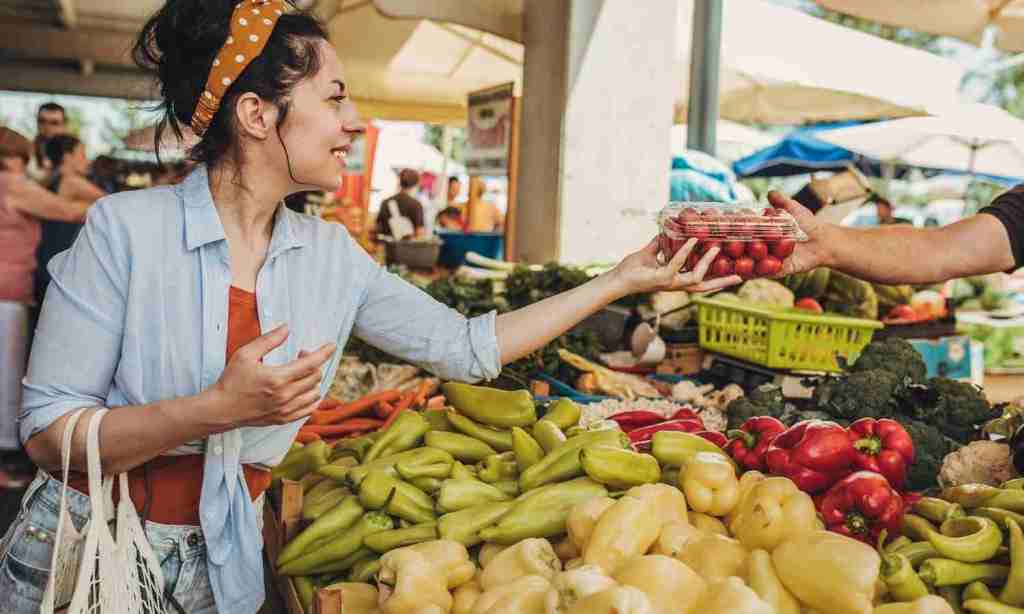The Latch has partnered with Suncorp Bank to deliver sustainability content that helps our readers drive positive action in their every day lives.
Sustainability can appear to be a big, wishy-washy and difficult term to ingest in our everyday lives. Would using your reusable cup for coffee instead of plastic really make a difference when 84% of the world depends on fossil fuels?
Our everyday actions can appear minuscule and, sometimes, mindless in the grand scheme of actions that need to make the world more sustainable and habitable for all of us. Ahead, we explore how exactly being mindful of your food, transport and daily activities can positively impact the environment.
Food
Australians eat an average of 3kg of food a day. Each meal is a choice you make for yourself and the planet. From where you shop to what you eat, every decision can be streamlined to help the environment and you.
Choosing to eat locally-grown food helps to reduce your carbon footprint, and also encourages a more positive and robust dependence on local farms. Instead of shopping at large supermarkets, consider going to farmers’ markets or small producers to get your daily needs, where possible. Every dollar you spend is a vote for the type of food system and the world you’d like to be a part of.

Eating what is available seasonally means that you are not eating fruits and vegetables that have been produced under artificial conditions from far away lands. Ask anyone over the age of 60, and they would tell you about when they would only eat strawberries in summer, instead of all year around.
Research has also shown that eating a less meat-heavy diet, by eating meat only two times a week, can significantly reduce water and land use by 45%. Currently, Australians report eating 92kg of meat per person, per year, which is more than four times the amount of meat recommended (the Heart Foundation recommends consuming no more than 350g of meat per week, which is roughly 18kg per year). This transition doesn’t have to happen immediately. You could begin by going meat-free for one meal, and then slowly increase this depending on how your body and health fares.
Food waste is also a big problem in Australia, where up to 7.6 million tonnes of food is wasted daily; equal to about 312kg of food per person, every year. One way to reduce food waste is to thoroughly meal plan at the beginning of the week and buy only what you need for those meals. Alternatively, you could invest in a compost bin at home to ensure that your food waste is regenerating organic matter for your plants.
Transport
Personal transport is Australia’s fastest-growing source of emissions and among the top three highest sources of emissions behind only energy and land use. As a big country, Australia guzzles a lot of fossil fuel to power personal transport. The best way to go is always on foot. Nothing beats walking to wherever you need to go if you can. This method releases no carbon emissions, it’s good for your body and, at the same time, it allows you to slow down and enjoy the beauty around you. When deciding whether it’s possible to walk wherever you need to go, a good measure is to walk any trip under 2km. However, to get through longer distances, cycling or skating could be another option that is equally healthy for the environment and yourself.

Let’s not forget flying as well. Taking long-haul international flights or domestic flights with many stop-overs can result in significant pollution. You could opt to carbon offset your flights or take other alternatives during your travels. Maybe take a road trip, a bike trip or explore all that is closer to home.
While waiting for governmental action on cycling routes and electric vehicles to concretise, you can do your part by planning your routes ahead of time and deciding on days that are ‘car-free’. This will save you money on fuel, and time to find parking and will consequently benefit the environment.
Daily Activities
Entertainment and leisure look different for everyone. This might look like visiting new cafés or going to pop-ups on the weekends. While for others, it might mean doing extensive exercise classes and a visit to the beach. There is no hard and fast rule to follow when it comes to making our daily activities sustainable.
Rather than following a do or don’t list, following the 3Rs (reduce, reuse, recycle) is a good principle to underpin any decision in the purchase. Additionally, asking yourself ‘why am I doing this?” and “do I have this already?” about the intention behind the activities you do is a good way to do a ‘self-check’.
The truth is, everyday actions may seem small in the grand scheme of governmental policies. However, governmental policies take time and are usually long-term. In the interim, while these policies take shape, our every small action counts and adds up. In the words of zero waste chef, Anne Marie Bonneau, “we don’t need a handful of people doing zero waste perfectly. We need millions of people doing it imperfectly”.
Read more stories from The Latch and subscribe to our email newsletter.
Any representations, views or opinions contained in this article are those of The Latch and do not reflect those of and are not endorsed by Suncorp Bank.







